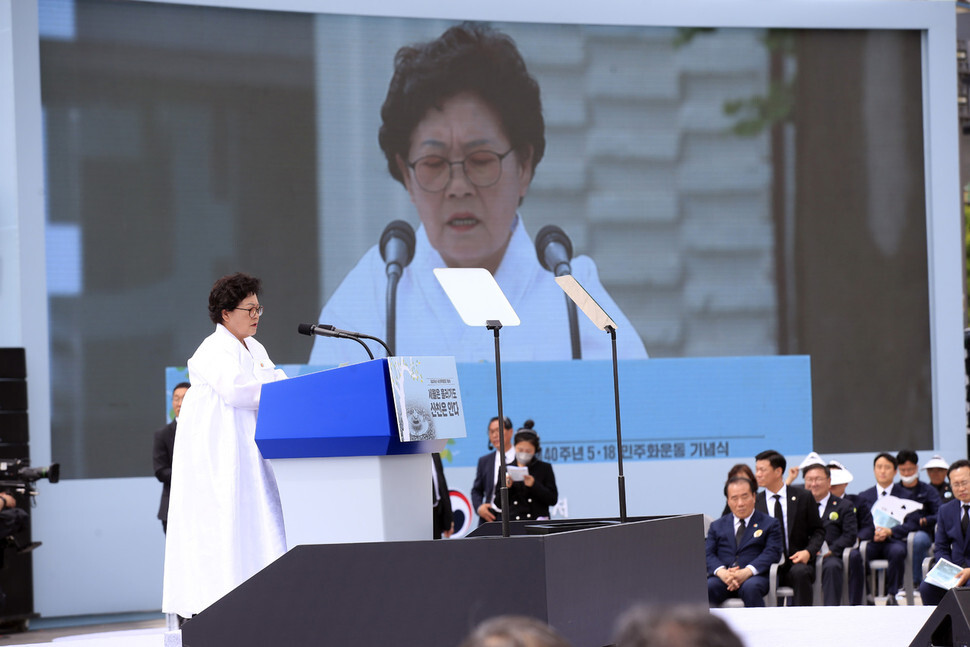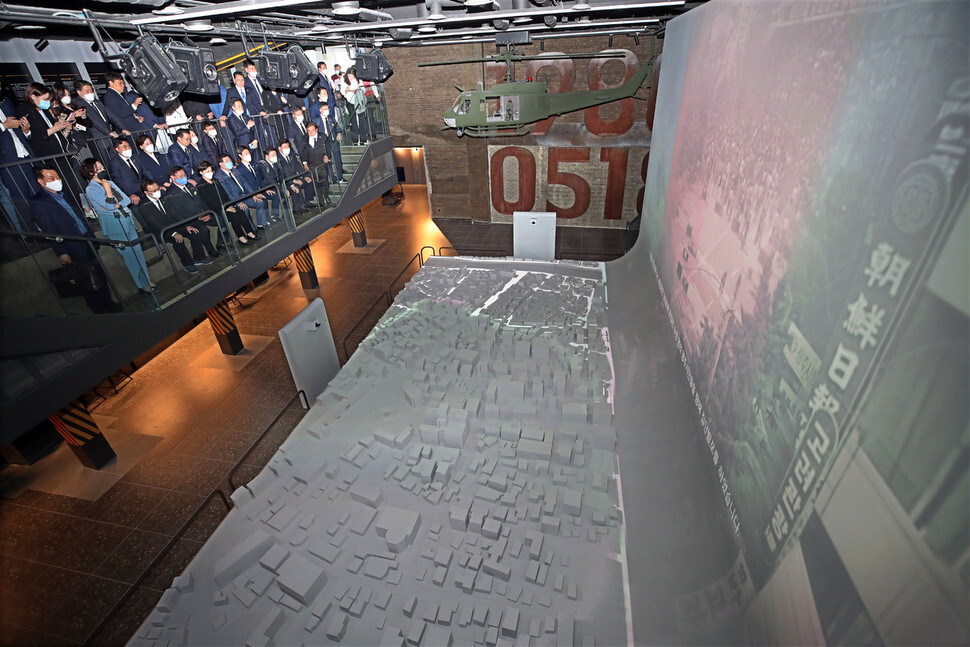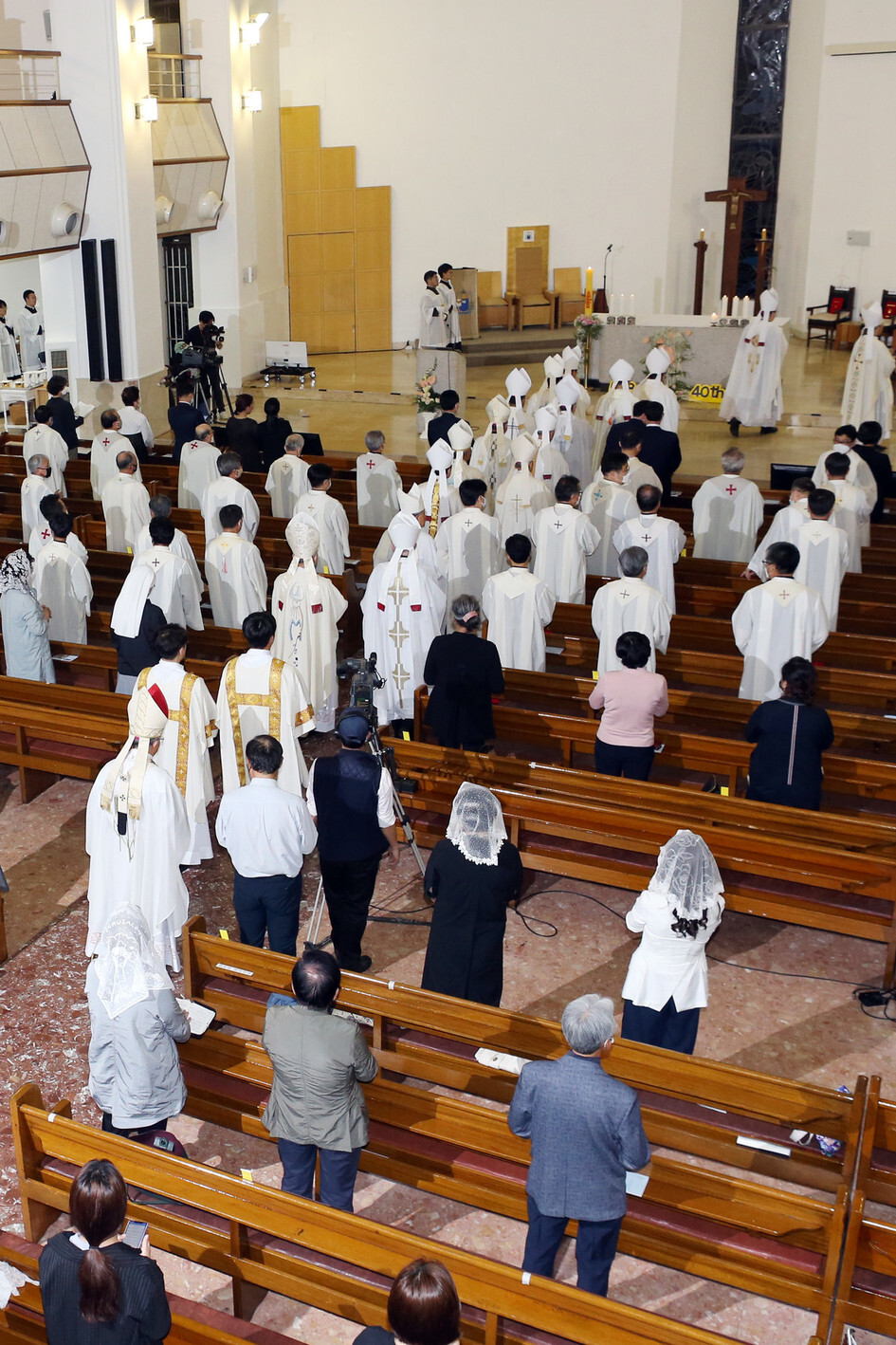hankyoreh
Links to other country sites 다른 나라 사이트 링크
People gather to commemorate 40th anniversary of Gwangju Democratization Movement
"

Time may pass, but the landscape remembers.”
The events of that day in May 1980 have once again returned to bring tears to the eyes of its survivors. As the Gwangju Democratization Movement’s 40th anniversary arrived on May 18, the city’s Geumnam Road rang out with both the tragic stories from the victims’ family members and calls for the truth to be brought to light. The atmosphere of consoling the spirits of May 18 and carrying on the spirit of unity reached its peak at the May 18th National Cemetery, where victims’ family members and citizens paid their respects all day long. The same day, Pope Francis sent a special May 18 message calling for the remembrance of young people who died for the sake of human rights.
For the first time this year, the commemoration ceremony was held in front of the former South Jeolla Provincial Office, which served as the heart of the movement. The ceremony that day shared the story of Choi Jeong-hee, 73, whose husband Im Eun-taek -- 35 at the time -- went out on May 21, 1980, to collect payment for a cow and was found 10 days later, having been secretly buried at the former Gwangju Detention Center.
“I had a difficult life being so young and having to care for three children on my own. At one point, I resented my husband for leaving me behind,” she recalled.
“If I ever saw my husband again, I’d want him to share a word of praise for how hard I worked raising three fine children,” she added.
As a commemorative performance, Kim Seon-jeong -- a professor at the Dankook University College of Music and Arts and daughter of May 1980 citizens’ militia member Kim Seong-chan, who passed away in 1982 after being tortured -- dedicated a spiritual purification dance to the “souls of Gwangju.” With impassioned dancing that left her body soaked in sweat, Kim conveyed a message of consolation to her father and the other spirits of May 1980.
The ceremony that day began at 10 am, when President Moon Jae-in arrived at the May 18 Democratic Plaza, and continued for one hour. As a gesture of remembrance by the younger generation, the progress report normally provided by the president of the 5.18 Bereaved Family Association was given instead by Kim Ryun-yi, 20, and Cha Gyeong-tae, 19, both family members of persons of merit in connection with the movement. During his commemorative address, Moon announced his intention to pursue an investigation of May 1980 and include the “May spirit” in the preamble of the Constitution, drawing loud applause from the attendees. The ceremony concluded as all of the attendees joined in to sing “March for the Beloved.”
After the ceremony ended that day, members of the public sent a message to politicians at the May 18 Democratic Plaza urging them to pursue an investigation of the movement. Democratic Party leader Lee Hae-chan and floor leader Kim Tae-nyeon toured Jeonil Building 245, a key piece of evidence supporting accounts of martial law forces firing upon civilians from helicopters.

Throughout the day, family members and other mourners visited the May 18th National Cemetery, where the remains of the movement’s victims are interred. The number of visitors was down from previous years amid the coronavirus outbreak -- but those who visited seemed to stay for longer, walking around the quiet cemetery as they somberly paid their respects. With the reopening of schools postponed, the presence of uniformed middle school students visiting on field trips had markedly diminished. The cemetery’s management office explained, “In May of last year, we had some 350,000 people who visited to pay respects.”
“A lot of events in Gwangju this year have been cancelled because of the coronavirus, and it appears that the number of visitors has dropped off somewhat because of the commemoration ceremony being held on the plaza in front of the [former] South Jeolla Provincial Office,” the office added.

The same day, Pope Francis sent a message to Gwangju churches urging them to “remember the sacrifices of young people for human rights.” In a commemorative mass for the 40th anniversary of the Gwangju Democratization Movement held at the Archdiocese cathedral in the Im neighborhood of Gwangju’s Buk (North) District, Archbishop Alfred Xuereb, the apostolic nuncio to South Korea, reported that the Pope was “pleased to hear about the commemoration of the 40th anniversary of the events that happened in May 1980.”
In his message, Pope Francis expressed his “hope that the sacrifices of the young people who gave their lives to protect human rights will be remembered.”
“The churches of Gwangju must continue playing a role and working to establish the social order in terms of respect for individual dignity and rights and the protection of life,” he urged.
He went on to say, “I hope that this commemorative event contributes to achieving peace and reconciliation and promotes feelings of solidarity and fraternity in the hearts of the South Korean people.”
The mass that day, which focused on the topic “Are We Living Like That Day?: Sharing and Solidarity to Live in a Society of Unity,” was jointly officiated by episcopate members including Cardinal Andrew Yeom Soo-jung and Archbishop of Gwangju Hyginus Kim Hee-joong.
By Kim Yong-hee, Jung Dae-ha and Ahn Kwan-ok, Gwangu correspondents
Please direct comments or questions to [english@hani.co.kr]

Editorial・opinion
![[Column] Will Seoul’s ties with Moscow really recover on their own? [Column] Will Seoul’s ties with Moscow really recover on their own?](https://flexible.img.hani.co.kr/flexible/normal/500/300/imgdb/original/2024/0513/5917155871573919.jpg) [Column] Will Seoul’s ties with Moscow really recover on their own?
[Column] Will Seoul’s ties with Moscow really recover on their own?![[Column] Samsung’s ‘lost decade’ and Lee Jae-yong’s mismatched chopsticks [Column] Samsung’s ‘lost decade’ and Lee Jae-yong’s mismatched chopsticks](https://flexible.img.hani.co.kr/flexible/normal/500/300/imgdb/original/2024/0512/3017154788490114.jpg) [Column] Samsung’s ‘lost decade’ and Lee Jae-yong’s mismatched chopsticks
[Column] Samsung’s ‘lost decade’ and Lee Jae-yong’s mismatched chopsticks- [Correspondent’s column] The real reason the US is worried about Chinese ‘overcapacity’
- [Editorial] Yoon’s gesture at communication only highlights his reluctance to change
- [Editorial] Perilous stakes of Trump’s rhetoric around US troop pullout from Korea
- [Guest essay] Preventing Korean Peninsula from becoming front line of new cold war
- [Column] The state is back — but is it in business?
- [Column] Life on our Trisolaris
- [Editorial] Penalties for airing allegations against Korea’s first lady endanger free press
- [Editorial] Yoon must halt procurement of SM-3 interceptor missiles
Most viewed articles
- 1Ado over Line stokes anti-Japanese sentiment in Korea, discontent among Naver employees
- 2[Column] Samsung’s ‘lost decade’ and Lee Jae-yong’s mismatched chopsticks
- 3Korean opposition decries Line affair as price of Yoon’s ‘degrading’ diplomacy toward Japan
- 4US has always pulled troops from Korea unilaterally — is Yoon prepared for it to happen again?
- 5Korean auto industry on edge after US hints at ban on Chinese tech in connected cars
- 6[Editorial] Yoon’s gesture at communication only highlights his reluctance to change
- 7[Correspondent’s column] The real reason the US is worried about Chinese ‘overcapacity’
- 8[Column] Will Seoul’s ties with Moscow really recover on their own?
- 9[Photo] Korean students protest US complicity in Israel’s war outside US Embassy
- 101 in 3 S. Korean security experts support nuclear armament, CSIS finds